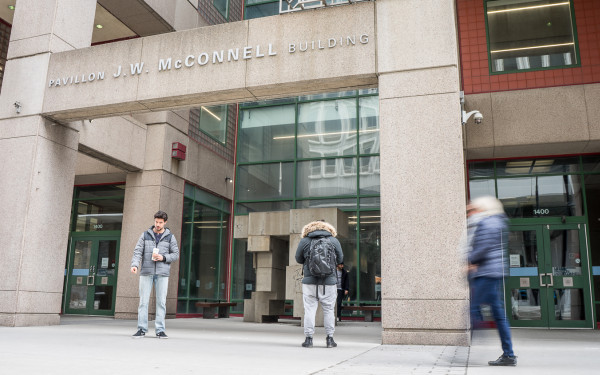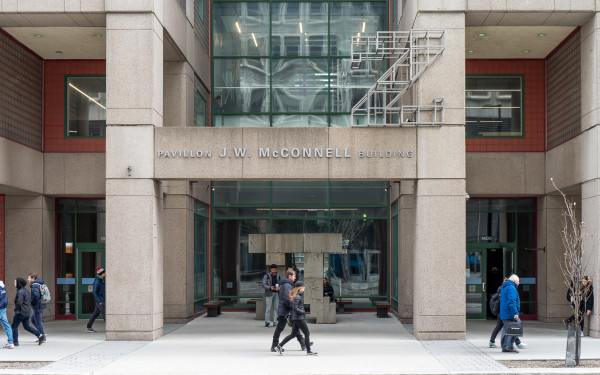Montreal youth express growing intolerance towards queer community
GRIS-Montréal reports a heightened sense of discomfort among Quebec students towards the LGBTQIA2S+ community
Montreal’s reputation as a queer-friendly city can be attributed to its overall sense of acceptance towards the LGBTQIA2S+ community.
The city bore witness to historic milestones that promoted awareness on queer issues and drove progress. Two such events were the 1977 Truxx raid and the 1990 Sex Garage raid, both considered as “Montreal’s Stonewall.” Much like the United States’ monumental Stonewall Riots, these events served as catalysts for the gay rights movement in Montreal.
Today, the city still hosts large-scale events platforming queer voices, one being the annual Fierté Montréal festival.
“There really is this different culture here in Montreal, in particular, as kind of like the biggest hub of queer culture in Quebec,” said Celeste Trianon, a trans activist and jurist. “It’s really enabled us to create this community infrastructure, which has really been at the forefront of so much of what’s happening [in the city].”
However, a recent local survey suggests that Montreal’s foundations in queer history and culture are not immune to the widespread sweep of conservative anti-LGBTQIA2S+ ideology.
The survey observed a steep growth in intolerance of the LGBTQIA2S+ community among Quebec’s youth population. In January 2025, GRIS-Montréal published a report indicating that between 2017 and 2024, high school students in several Quebec regions expressed increasing levels of discomfort towards members of the queer community.
In the 2017-2018 school year, 24.7 per cent of students said they are uncomfortable having a gay best friend, while 15.2 per cent reported discomfort for having a lesbian best friend. In the school year 2023-2024, discomfort levels for having a gay best friend and a lesbian best friend spiked to 40.4 per cent and 33.8 per cent, respectively.
GRIS-Montréal, a non-profit community organization geared towards demystifying sexual orientations and gender identities, has been doing interventions on this topic at schools for the past three decades.
The organization’s director of research, Gabrielle Richard, said acceptance had improved since they started, but that recently, GRIS’s volunteers have been voicing suspicions that tensions are worsening again.
“We have had volunteers that were coming back to us telling us, ‘It’s really getting more difficult in classrooms at the moment,’” Richard said. “In some situations, they are getting hate from students [who] can be verbally abusive. Some of the students get up and leave the classroom while they intervene and talk about their lives.”
GRIS collected data from 35,705 questionnaires that gauged student comfort levels for different scenarios involving a person of sexual diversity. According to Richard, Montreal students represented 63 per cent of the sample.
The results found that growth in intolerance is prominent among young boys, who reported discomfort levels that almost doubled those of girls. The report also found the steep rise in intolerance began in 2021. According to Richard, GRIS has pinpointed the social isolation from the COVID-19 pandemic as a potential cause.
Both Richard and Trianon agree that a correlation between social media usage and intolerance is probable.
“Social isolation at large, especially when it came to the COVID-19 pandemic, has really amplified a lot of this discourse,” Trianon said. “It’s pushed a lot of people from real-life connections to just social media, where these far-right influencers have the most reach.”
Trianon explained that algorithms and echo chambers undeniably lead to polarization, where people are served with individualized content solely legitimizing their existing beliefs. These networks allowed content creators such as Joe Rogan and Andrew Tate—who are well-known for spreading misogynistic and hateful perspectives online—to gain traction, particularly among youth.
“[They] became very much the people who are dictating and influencing the lives of young boys because they’re being looked upon, not as cautionary tales but as role models,” Trianon said.
Trianon highlighted that Montreal’s progressive history does not shield it from conservative politics.
“The cause of this far-right hatred is happening at a worldwide global scale; it is something which goes beyond Quebec,” she said. “We’re talking instead about a moment which has its roots primarily in the United States, but has gained so much power worldwide that it is now affecting politics all across the globe.”
Besides global momentum, she added that there is a local component at play for planting the roots of such strong influence, especially for anti-trans hate.
“Local collaboration is precisely what enables anti-trans hate to spread without any issue here,” she said. “For example, with local newspapers constantly publishing anti-trans op-eds or similar things—these are all local phenomena and let’s not discount them as mere interference.”
According to Trianon, the GRIS-Montréal report is alarming at its core, but mostly because it translated the queer community's fears and anxieties into concrete numbers.
“The report just confirms what we all knew all along within the community, which is that things are getting bad real quick,” Trianon said. “I was not surprised a single bit, yet I still cannot help but be disappointed because this is not us— this is not the road that we tried to build for so long.”
Richard’s team suspects that their data underestimates the real decline in tolerance, because the schools that most need interventions might not be reaching out to them. As such, she said that the current numbers do not come close in representing the realities faced by the local queer community.
“It’s a problem that a lot of people don’t realize because they don’t get served the same [social media] content,” said Jessica Winton, senior coordinator at Queer Concordia. “I think a lot of people really don’t have that strong of opinions, but their opinions are kind of fed by other people or the media that they consume.”
Winton said that in her experience, intolerance usually manifests in subtle ways, or as some would call it, microaggressions.
“We know when someone’s not tolerant of us,” Winton said. “It’s very telling when people don’t make eye contact with you, don’t talk to you, don’t say ‘Hi.’”
Winton said that her experience as a student at Concordia University has been generally positive, but that nonetheless, she strives to promote a positive environment for its queer community.
“When it comes to making safe spaces, I would say it’s always better to lead,” Winton said, adding that it starts from simply introducing her name and pronouns.
Other times, she said, it’s about hearing people’s stories, and at large, it’s about helping them navigate complicated systems, like preferred name changes and healthcare. According to her, these actions are what build a community, and thus create spaces where people can express freely and live openly.
One particular concern for Winton is that the people usually reaching out are people who are already out and comfortable with their sexualities and identities.
“So, people who are maybe less secure with their identity, they are maybe just at home, scrolling on their phone, absorbing all the negative news, and I’ll never hear from them,” Winton said.
Drawing from the recurring nature of history, Trianon suspects that the alarming rate of intolerance towards the queer community will only get worse from here on. Yet, she added that people should not take it as a sign to bury their heads in the sand.
“What we have to do is evolve our means of thinking to really start defending critical thinking, defending human rights, and defending the ability of every one of us to live free and happy lives in this society of ours,” Trianon said.
This article originally appeared in Volume 45, Issue 10, published March 4, 2025.




_600_375_s_c1.png)
_600_375_90_s_c1.jpg)

